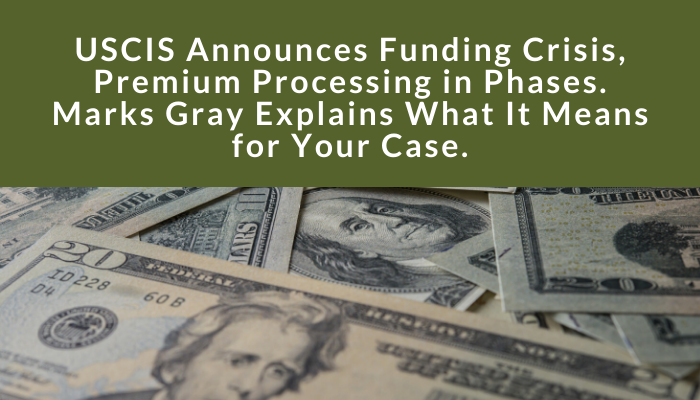Recently, USCIS said if it does not receive $1.2 billion in emergency funds from Congress, it would furlough thousands of employees at the start of July. On the flip side, after suspending service for several months, they released a schedule for the phased reopening of premium services. What does this mean for you?
Let’s deal with the budget issue first.
If USCIS is not funded and the furloughs occur, this would result in ongoing delays and adjudicatory disruption. This would obviously be frustrating and potentially cause difficulties for all having to work with USCIS.
However, if Congress approves the emergency funds, USCIS has said they plan to repay US taxpayers by adding a 10 percent surcharge onto new immigration applications. This is above and beyond already-anticipated increases to filing fees that are expected soon.
Bottom line? If you have to file a new case, waiting could end up costing more.
What about the phased reopening of premium services?
USCIS is bringing back these offerings in four phases, two of which are already available.
- Phase 1: June 1, 2020 – Premium service returned for every I-140 category but for EB-1 Multinational Executive/Manager and EB-2 National Interest Waiver. Neither of these two categories previously qualified for premium processing.
- Phase 2: June 8, 2020 – Premium service returned for all pending I-129 petitions filed before June 8 with the exception of some H-1B categories. Qualifying H-1B petitions include Amendment, Cap-exempt, Extension, and Transfer petitions.
- Phase 3: June 15, 2020 – Premium service will return for Amendment, Cap-exempt, Extension, and Transfer I-129 H-1B petitions filed on or after June 8, 2020.
- Phase 4: June 22, 2020 – Premium service will return for I-129 Cap-subject H-1B petitions as well as all other petitions filed on or after June 8, 2020.
A couple of things to note.
First, USCIS is not allowing to upgrade H-1B cap petitions to premium processing until phase 4.
Second, you must receive a receipt notice from USCIS before you can upgrade a petition that has already been filed to premium processing. Receipt issuance delays are not uncommon.
Finally, these phases may change if necessary.
